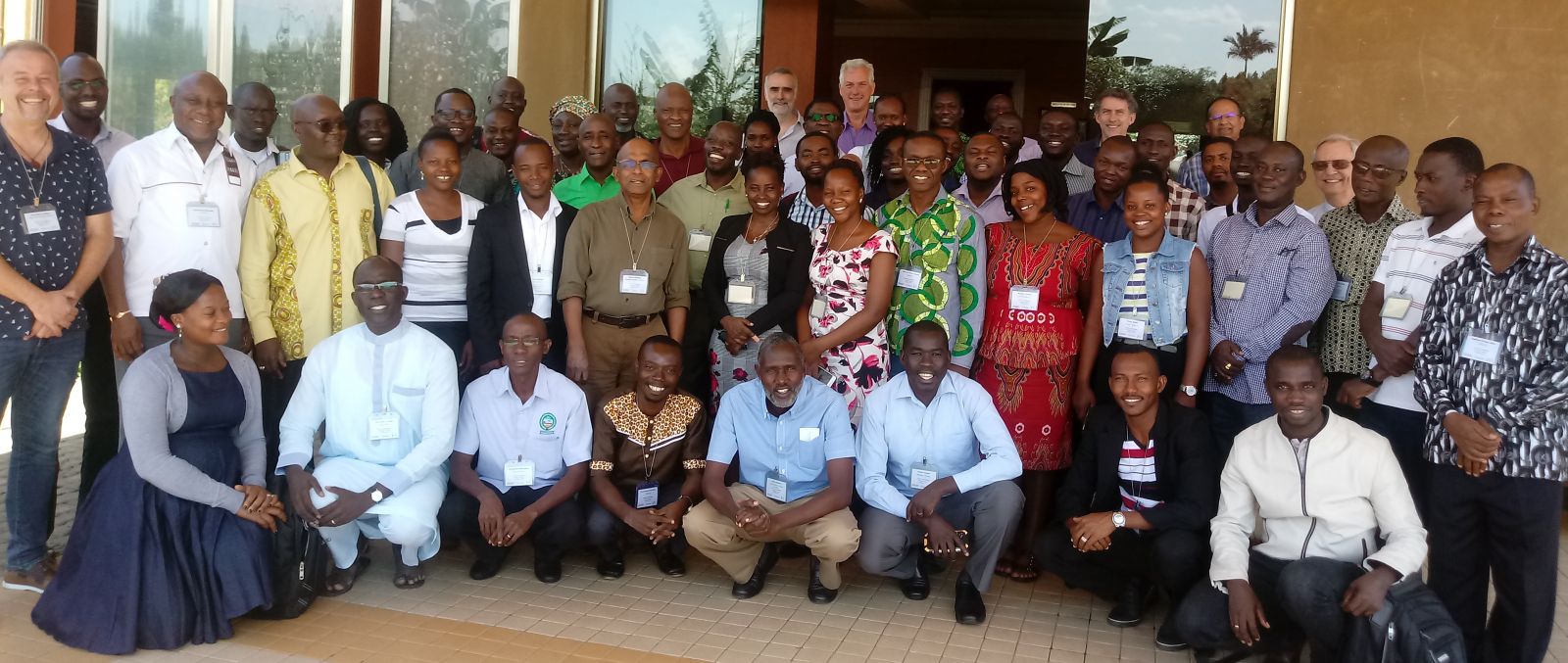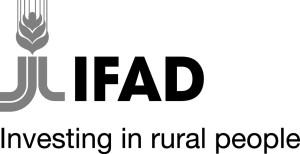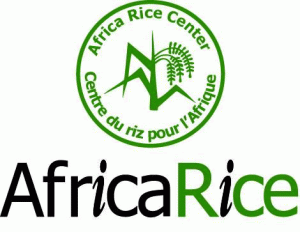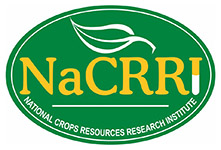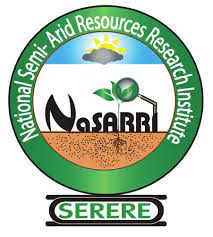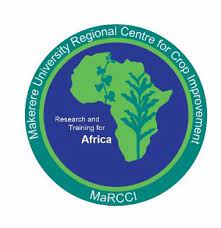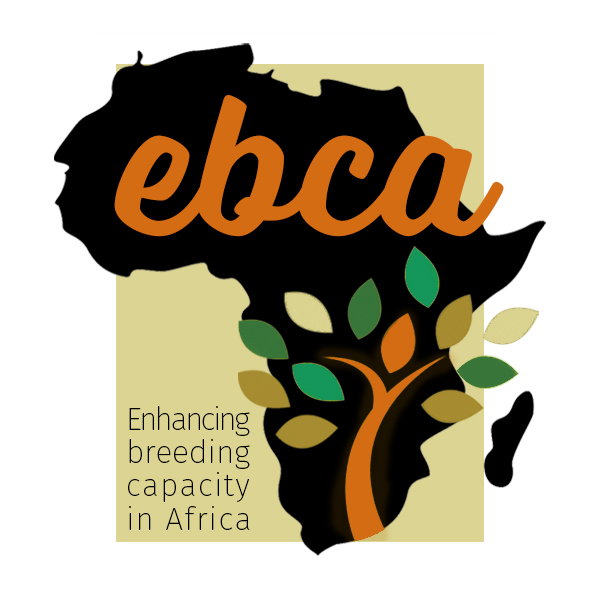 The EBCA project on ‘Enhancing institutional breeding capacity in Ghana, Senegal and Uganda to develop climate resilient crops for African smallholder farmers’ focuses on demand-driven crop improvement. The project has a total budget of $4.3M over 2018-21 with $2.5M funded by the International Fund for Agricultural Development (IFAD) and has been implemented by the Integrated Breeding Platform (IBP) and AfricaRice, in close collaboration with national agricultural research system (NARS) partners.
The EBCA project on ‘Enhancing institutional breeding capacity in Ghana, Senegal and Uganda to develop climate resilient crops for African smallholder farmers’ focuses on demand-driven crop improvement. The project has a total budget of $4.3M over 2018-21 with $2.5M funded by the International Fund for Agricultural Development (IFAD) and has been implemented by the Integrated Breeding Platform (IBP) and AfricaRice, in close collaboration with national agricultural research system (NARS) partners.
The overall goal of the project is to contribute to enhanced food security and poverty alleviation by increasing smallholder productivity and income. It seeks to achieve this by enabling the development and dissemination of ‘fit-for-purpose’ improved crop varieties that meet the needs and wants of both farmers and consumers along the crop value chain, as well as being resilient in the face of challenges such as disease and climate change.
The project works directly in three low-income African countries (Ghana, Senegal and Uganda) where agriculture is key to rural livelihoods, although benefits have spilled over into additional counties through partnership networks. It is focused on two staple crops, groundnut and rice, with some additional activities in bean, cowpea and sorghum.
The EBCA project is deeply rooted in a ‘people first’ philosophy, inherited from the Generation Challenge program (GCP), under-pinned by partnerships based on trust. Project activities are focused on strengthening the capacity of national crop breeding programmes, facilitating their leadership, priority-setting and adoption of best practices. The project also seeks to help train the next generation of plant breeders and scientists in modern plant breeding through supporting MSc and PhD students. It is projected that up to 30,000 smallholder farmers in the three project countries will benefit directly from better crop varieties. In the longer term, EBCA will leave behind stronger research capabilities in the participating breeding programmes, as well as greater linkages between researchers and other stakeholders along the value chain, such as farmer associations and seed businesses.
The EBCA approach
Project philosophy
The EBCA project has adopted an approach that aims to leverage and build upon existing networks and initiatives with an emphasis on NARS leadership and ownership to establish a foundation for ongoing sustainability of the outcomes generated. This approach, with clear objectives and outputs defined, has enabled the NARS partners to identify gaps in their plant breeding programmes and to apply EBCA project resources to areas where they are most needed and where they will be most effective. The project has therefore been able to rapidly achieve significant impact over a short timeframe, providing a return on investment substantially beyond that which would normally be expected with a modest budget and limited timescale.
The role of the IBP and AfricaRice as project implementers has therefore been one of catalysing activities, fostering synergies between partners, and maintaining project momentum and direction. The EBCA project puts NARS partners in the driving seat, while providing support, expertise and guidance in areas such as planning, coordination, access to services, digitisation and analysis. A key aspect of this approach has been the engagement of external breeding experts as advisors, supporting, when needed, NARS partners at every stage from planning to troubleshooting breeding activities to analysing results. Early in the EBCA project, each NARS breeding programme developed their respective workplans, providing a conscious opportunity to examine, set and pursue their priorities. They then received more than half of the total project budget to implement those workplans.
Project structure
EBCA project activities are organised around four components, which we consider to be the four pillars in building a sustainable and demand-led crop improvement program. These are: i) connecting the dots between breeders, extension workers, farmers, businesses and consumers along crop value chains; ii) improving data management and digitising breeding; iii) integrating modern approaches into plant breeding, such as the use of genetic information; and iv) enhancing both human capacity and infrastructure.
This approach has been embraced by IFAD as an exemplary model for future, similar projects. The EBCA project is already a case in point; the CORAF-led EU-DeSIRA project ABEE is taking advantage of methodologies, partnerships and networks formed by the IBP (and CIRAD) during implementation of the EBCA project as well as an existing regional network (IAVAO).
EBCA outcomes: the numbers
The EBCA project, by taking a cross-cutting, NARS-led approach, connecting to other initiatives, and filling the gaps in breeding programme needs, has provided a substantial return on investment. It has achieved, or contributed to, outcomes well beyond those that could be obtained alone with a traditional ‘vertical’ approach, within its modest budget and limited timeframe. The EBCA project has created significant impact across a range of indicators as may be seen in the attached “EBCA in numbers: A measure of impact”.
- Data management and modernisation of breeding: partners have added data on 15,000 breeding lines to the IBP Breeding Management System (BMS) and uploaded > 350,000 field data points. All partner institutions have developed an institutional data management policy.
- Programmes deploying molecular breeding techniques have generated over 250,000 genotypic data points so far, an astounding amount of new information contributing to better and faster breeding decisions.
- Improved varieties: Contributed at different levels to the development of 90 improved lines across five crops.
- Training the next generation: The project has partnered with leading universities to support 7 PhD and 16 MSc students and 165 MSc students have been trained in the use of the BMS.
- Farmer participation: More than 200 participatory varietal selection (PVS) trials have been conducted along with > 300 participatory rural appraisals to understand farmer needs and challenges. The participation of women in these trials and appraisals has been significant (45%). In total, the project has engaged directly with more than 11,000 farmers and indirectly has reached 190,000.
- Private-sector involvement: The project has engaged 22 seed companies and 110 seed producer associations to produce > 6,000 tons of certified seed.
Elements of impact
Partnerships
The IBP has used its extensive experience in technology transfer and network animation to facilitate the development and revision of breeding objectives, both within national programmes and across the regions. This ‘bigger picture’ lens adopted by the IBP has been supplemented by a close working relationship with the CGIAR Excellence in Breeding (EiB) platform through engagement with their NARS outreach program, through the modernisation of breeding pipelines in Ghana and Uganda and through the coordination of genotyping analyses by Intertek. The EBCA project has leveraged existing networks and enabled the development of new collaboration, not only within West Africa (Ghana, English speaking, Senegal, French speaking) but also between West and East Africa. The IBP was an active participant in the formation of the African Plant Breeders Association in 2019 and it is this kind of forum, together with the networks that are gaining momentum, that will assure the future of plant breeding in Africa. This groundswell of activity is perhaps best summarized by the following quotes:
“EBCA was part of a long process, and without the history of collaboration in the region we would not have had the success we did,” says Dr Fonceka, CIRAD scientists posted at CERAAS in Senegal.
“Sharing – our material, data, time and ideas – is all a mark of trust, and trust is a function of time and of ongoing partnership building.” IBP Management.
Private sector engagement
Complementing the impressive research achievements at NARS institutions EBCA, via local partners, has engaged actively and extensively with the private sector, particularly farmer organisations and seed companies, as an essential component of the project. Such linkages with the private sector are crucial to scaling out research outcomes for impact and, ultimately, to long-term sustainability. A viable, thriving seed industry creates valuable jobs and wealth, particularly for rural young people, as well as being good news for farmers. Ultimately, the EBCA model promotes a research for sustainable investment approach, whereby research products meet real needs and have a value beyond the life of the project.
Digitisation
Modernising breeding programmes not only includes the incorporation of genetic information and molecular breeding techniques, but also the use of the BMS to facilitate all stages of breeding and data management, and the integration of appropriate ICT tools for day-to-day-use to male breeding more efficient and effective. These are connected to a project knowledge base (knowledge module- KM), allowing easy storage of, access to, and analysis of information and for this to be shared extensively along the seed value chain. Applications (Apps) for farmers and seed management are currently under development and will be important in exchanging information and data between breeders, seed dealers, extension agents and farmers. Digitisation enables increased quality control and product traceability and this has been achieved through the introduction of electronic tablets to collect data in the field, eliminating the risk of losing paper field books, the need for time-consuming data entry and the potential to introduce errors. Similarly, bar code printers and scanners to label every seed sample, make the work of tracking and tracing much easier and more efficient, cutting down on mistakes and connecting the physical steps of the breeding cycle with information in the BMS.
Gender
Gender is an overarching concern for the EBCA project, and it is considered by all partners in planning their activities. Gender representation is particularly important for successful and equitable demand-led breeding, since women often tend to carry out specific farming and household tasks, which means they may have very different wants and needs to men when it comes to agronomic, storage, cooking and eating qualities. The project has committed to a goal of at least 40% women participants and this target has been exceeded; of the more than 11,000 farmers engaged in rural appraisals, participatory varietal selection, seed distribution for farmer testing, training, and field demonstrations and similar activities, 43% have been women.
Nutrition
The five crops invested in by the EBCA project – bean, cowpea, groundnut, rice and sorghum – offer the opportunity for diversified household diets and improved nutrition. Moreover, one of the key traits for groundnut breeders is oleic acid content since higher content results in a longer shelf life for groundnut products and better health outcomes for consumers.
Conclusions
The EBCA project has achieved impacts and a return on investment far greater than expected within its modest budget and limited three-year timeframe. It has done so by emphasising partnership and NARS leadership, creating a cross-cutting, gap-filling approach that generates synergies and magnifies outputs. Demand-led crop improvement draws on private-sector engagement to understand what the market needs and it delivers varieties that seed dealers want to sell and farmers want to grow. EBCA has helped breeding programmes set priorities and reach targets faster due to improved data management, digitisation using ICT tools and modernisation of breeding processes. The project is also nurturing the next generation of breeders through supporting students and building partnerships with universities.
This project has highlighted the potential for genetic gain to amplify in farmers’ fields through a digitised seed value chain that is highly scalable.
